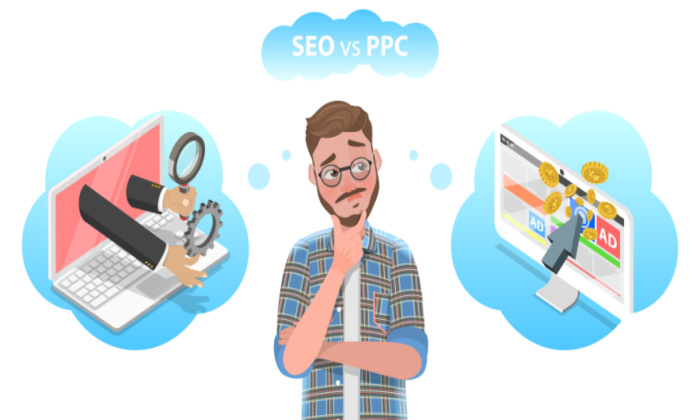“Which is better, SEO vs PPC?” If there’s one question I get asked more than any other, this is it. Everyone wants to know who wins in the battle and where they should spend their marketing dollars. And everyone hates when I tell them there isn’t an easy answer. Like everything else, it depends. Neither SEO nor PPC is fundamentally better than the other. As you’ll discover in this article, each tactic has its own set of advantages and disadvantages. What is almost always true is that SEO and PPC work better together. Don’t believe me? I’ll prove it. In this article, I will: Guide you through the positives and negatives of both digital marketing strategiesShow how each of them supports your business Show you how PPC and SEO work together Ready? Then let’s look at my favorite digital marketing strategy first. How SEO Supports Your Business If you need a search engine optimization primer, read my guide to SEO before going any further. If you don’t, you should already have a pretty solid understanding of how ranking on a search engine’s result pages can generate awesome traffic that grows your business. Almost any business can benefit from the free traffic that search engines like Google send their way, but that’s not to say SEO should definitely be the be-all-end-all when it comes to marketing strategies. As you’ll read below, while there are plenty of benefits of SEO, there are also a couple of drawbacks to be aware of. Pros of SEO It’s cost-effective. SEO can be one of the cheapest forms of marketing and an incredibly cost-effective way of growing your brand. You don’t have to pay to receive organic traffic, and you can do much of the work yourself. But even using an SEO agency is much more cost-effective than PPC. It delivers long-term results. If you do SEO correctly, your efforts can pay dividends for years to come. Not only will you avoid Google penalties, but SEO also has a habit of compounding. The top pages get more backlinks by virtue of being the top-ranked pages on Google. In turn, that makes them even more likely to continue ranking high in the future. It targets every part of your funnel. Consumers are using Google at every stage of the buyer’s journey. That makes SEO one of the few digital marketing strategies to target every part of the sales funnel. Use SEO to engage customers early in their journey, and you should be able to significantly decrease acquisition costs. Great brand awareness and trust. The more you appear on Google, the more consumers will trust your brand. And unlike PPC, you don’t have to spend a fortune to dominate the search results. With a focus on content marketing, you can become the go-to resource for your industry, appearing for every relevant keyword and positioning your brand as the trusted authority. Cons of SEO It takes time. Your SEO efforts aren’t going to drive instant results. It can take between six months and a year to see significant traction. As you can see from the graph below from content marketing agency Grow & Convert, there is a direct correlation between the length of engagement and the number of first-page rankings. Results can occur faster, but SEO may not be your best bet if you need to drive traffic now. That doesn’t mean you should avoid it, however. The sooner you start with SEO, the quicker you’ll see the kind of long-term results I described above. You need to keep investing. While you can stop all SEO efforts and continue to see excellent results, I wouldn’t recommend it. In order to keep competing with the top brands, you’ll need to continue to publish new content, update existing articles and stay on top of the latest advice from Google. You must be precise. You can’t half-heartedly work on SEO. Because Google and other search engines are constantly updating their algorithms and penalizing sites that use black and gray hat optimization techniques, you need to do SEO the right way. Trying to cheat the system and get quick wins will only see you end up with a penalty. And once you get penalized by Google, it’s far from easy to recover. It requires a high level of skill. While anyone can do the work of an SEO in theory, being successful is another thing entirely. Not only is there a lot to know because of the complex nature of Google’s algorithm, but the work can be incredibly time-consuming. So even if you follow my advice, you may not necessarily have the resources to create content, optimize your on-page elements and build links. That’s why most people will look to hire an SEO consultant or an SEO agency, instead of doing the work themselves. How PPC Supports Your Businesses PPC stands for Pay Per Click Marketing. It is the practice of using paid advertising on search engines like Google and Bing to drive targeted traffic to your website. If you need more information on the basics of PPC, check out my overview of PPC before reading on. As you can see from the screenshot above, PPC gives you the opportunity to appear at the very top of search engines. I’ll show you below just how powerful that can be. But don’t think that kind of placement comes for free. Among the biggest cons of PPC is the price you have to pay. Let’s dig into those pros and cons further. Pros of PPC It delivers instant results. PPC is possibly the only digital marketing strategy where you can see results the same day you launch a campaign. The same certainly can’t be said for SEO. Of course, you’ll need to pay a lot to achieve fast results, and you’ll still need to create a great landing page, but it’s certainly possible to see a return on your investment within a week. You can scale results quickly, too. If your ads and landing
